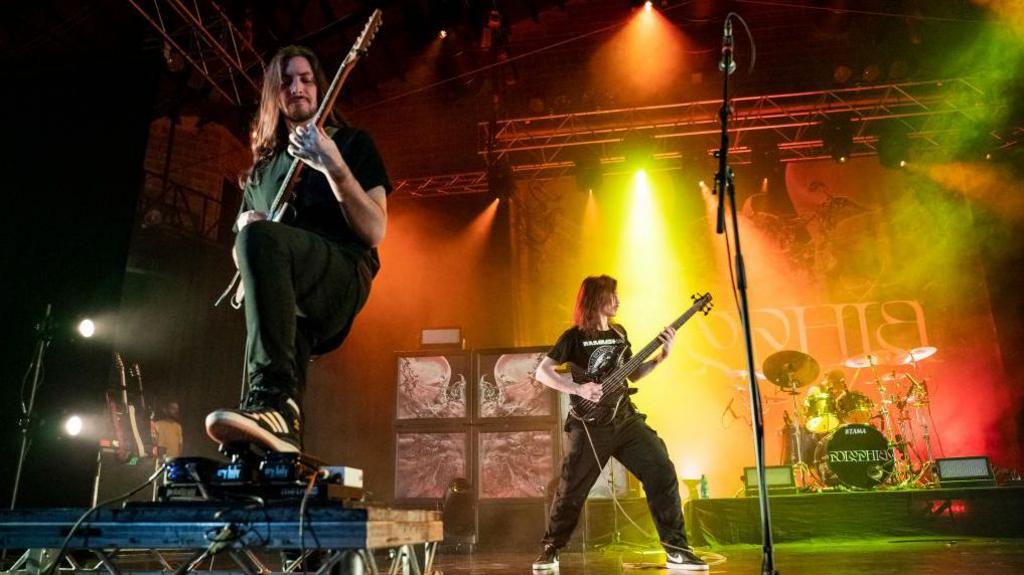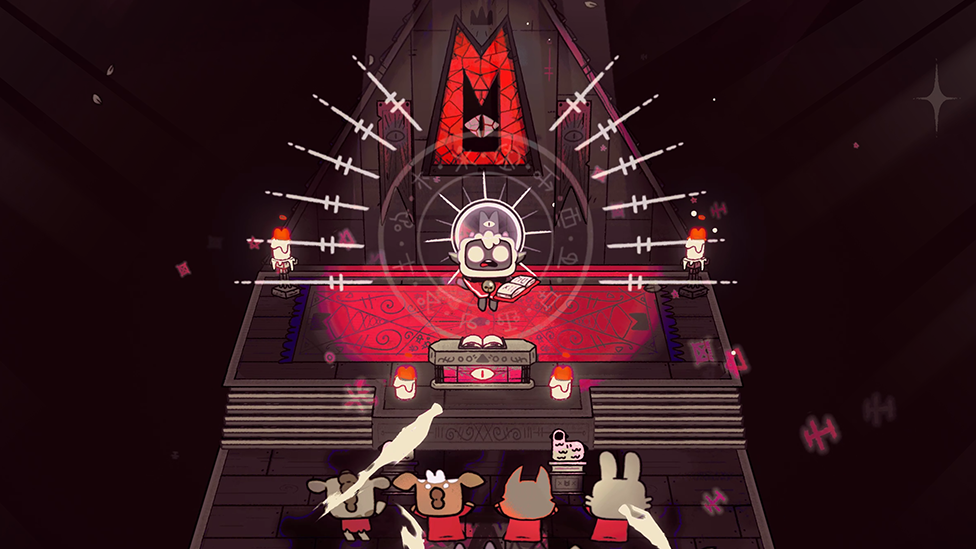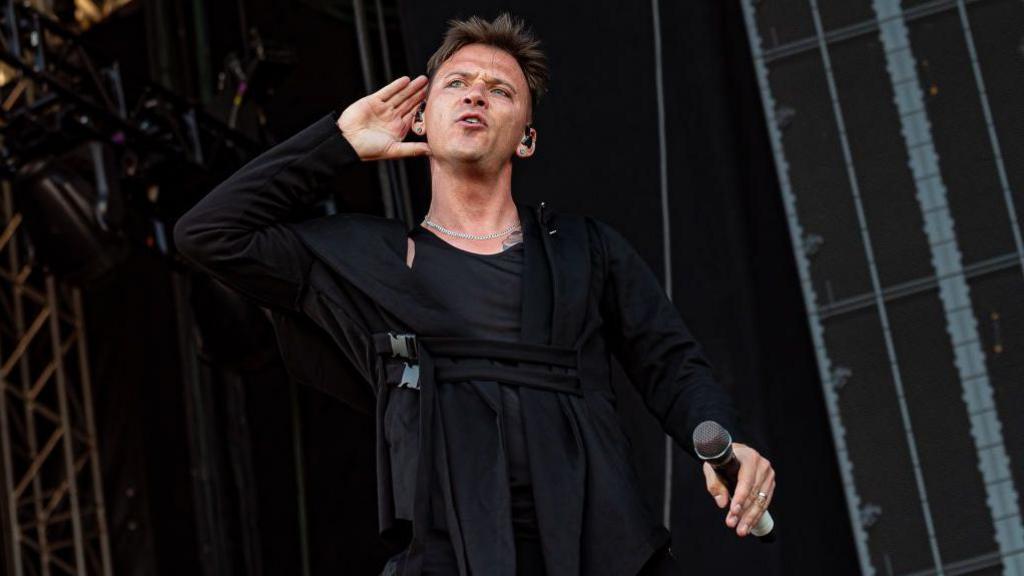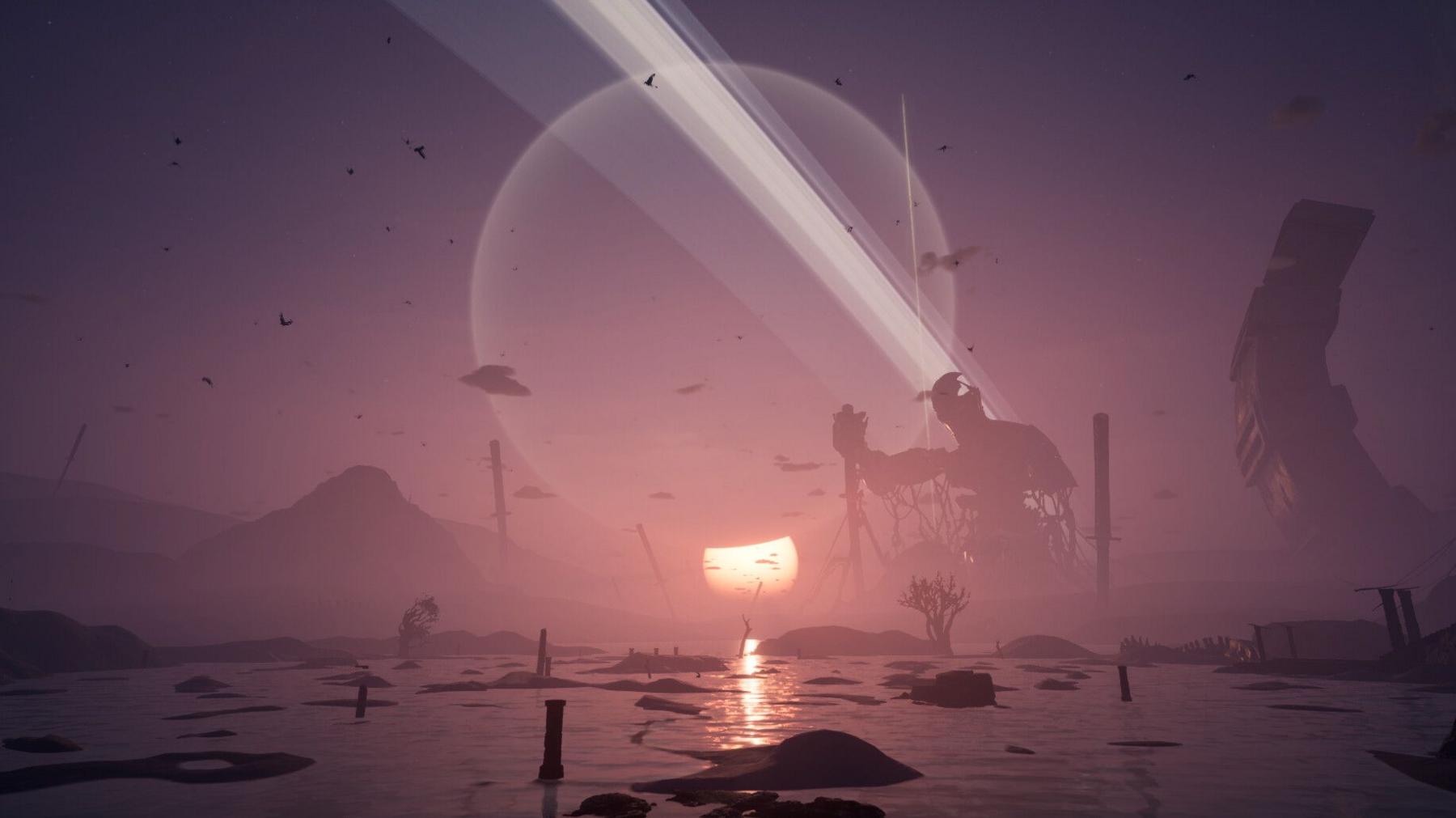The battle for metal bands to get into gaming

Sean Long, from metalcore band While She Sleeps, appears on a covers album inspired by indie game Cult of the Lamb
- Published
"Why don't you make music for video games?" is a question Sean Long gets asked a lot.
The guitarist, part of Sheffield-based While She Sleeps, says fans often suggest titles they think would be a perfect fit for the metalcore band's sound.
He's not surprised by the crossover - heavy music and gaming can both be seen as outsider interests.
"Maybe it's a slight sense of not feeling like you're really fitting in with the majority, which is so common," he tells BBC Newsbeat.
"You find other means to express yourself and the stuff that everyone else seems to be doing maybe isn't resonating with you as much."
Sean remembers being in his bedroom at 01:00, riffing on his guitar, lost in music, and sees parallels with gaming there.
"You find yourself in another universe, completely in this unconscious realm," he says.
"And when you're making the music, there's a similar aspect.
"Positive escapism."
Sean says he'd love to make music for a video game. But he wouldn't know where to start.

Guitarist Scott LePage (left) and bassist Clay Gober describe themselves as keen gamers
It's a situation guitarist Scott Le Page and bassist Clay Gober, from Texas-based rock band Polyphia, recognise too.
The pair tell Newsbeat they're "pretty avid gamers" - Clay's a fan of titles by acclaimed directors Hideo Kojima and Ken Levine, Scott loves the notoriously challenging Dark Souls series - and keen to work in the area.
"We were kind of looking for an opportunity to do what we already do and add that to our hobby and kind of mix those two worlds together," says Scott.
Even though Sean and the Polyphia boys are members of two established bands with more than two million monthly listeners between them, all three told BBC Newsbeat they hadn't cracked the games industry.
Despite the crossover between fandoms, there is still a lack of transparency and understanding between music and gaming.
But their potential foot in the door came from a breakout indie hit.

Cult of the Lamb mixes cute cartoon animals with heaps of occult themes and imagery
Cult of the Lamb is a quirky 2022 release featuring cute cartoon animals the player must turn into loyal followers of an entity known as The One Who Waits.
It was a big success for developer Massive Monster and publisher Devolver Digital, who commissioned Scott, Clay and Sean to create a collection of heavy metal covers versions of the game's soundtrack.
They appear on the six-track EP - Cult of the Lamb: Hymns of the Unholy - with members of bands including Killswitch Engage, Trivium and Monuments.
Given the game's themes, it's easy to see why the crossover made sense to the artists, and they say the creative opportunity appealed to them.
Sean says: "I'm so aware of how important soundtracks are, especially when you're younger and you really immerse in those games.
"It's so special and it really plays a part in the way that you listen to things as you grow up."
Scott, from Polyphia, says it was a chance for him to step outside his comfort zone and experiment with a different style of rock music.
"It opened up a little bit of my thought process of writing," he says.
Both bands hope it could be a step towards them doing more work in the gaming space.
But the singer of one band took matters into his own hands.

Dan Tompkins, frontman of metal band Tesseract, has made a game based around the band's music
Dan Tompkins, lead singer of progressive metal band Tesseract, has been working on a game based around the band's fifth album, War of Being.
He started live-streaming on Twitch during the Covid-19 pandemic and experimenting with VR performances.
That inspired him to team up with a programmer, designer and concept artist, as well as teaching himself to use video game engine Unreal 5 to create the virtual reality game.
Players navigate a world based on the album, unlocking parts of a song which they get to hear in full at the end.
War of Being has had a positive reaction since the release of an early access version, which Dan is continuing to work on alongside making music.
He admits the project has "just kind of snowballed and gotten bigger and bigger and bigger," and probably isn't something many others could replicate.
But he estimates that the band's following has grown by thousands since he started working on the game, and it has helped them make connections within gaming.
Tesseract recently recorded an end credits track for Wild West-themed shooter Soulslinger and he thinks tie-ups like this will become more achievable in future.
For him, he sees it as one of the ways bands can "develop a following and retain it and reward your fans for their commitment to supporting you and doing interesting things."

Dan says War of Being is designed to be a way for fans to experience Tesseract's music in a "visceral" way
There's a long relationship between videogames and alternative music, from early first-person shooter Doom to games like Tony Hawk's Pro Skater and Guitar Hero.
Gaming scores and soundtracks are now recognised by mainstream organisations like the Grammy Awards, and live performances of videogame soundtracks are becoming increasingly popular.
With the costs of touring rising and rates from streaming services low, could gaming be another way for bands to support themselves?
Scott admits "it's certainly nice to see more royalties come in from doing anything at all", but says he thinks doing something purely for the money means you're doing it for the wrong reasons.
Sean from While She Sleeps agrees that it's important to leave space for creatively fulfilling work, but says artists still have bills to pay.
"Make sure there's enough integral space to make sure that you're writing your main projects for the love of the music," he says.
Raye says gaming is her secret to escaping life
- Published21 October 2024
'Everybody wants to be in': How songs are chosen for EA FC
- Published28 September 2024
Grand Theft Audio? The tricky business of music and gaming
- Published10 September 2024
Do they have a dream project?
Scott says anything by From Software, the developer of his beloved Dark Souls, would make him "literally pinch myself and be like: 'Hang on a second, am I dreaming?"
Polyphia band-mate Clay says: "Anything made by Ken Levine. I'm a big Bioshock guy and I grew up playing Thief and all the sequels to that.
"So that would be something that would make me evaporate into thin air with excitement."
Sean says he's recently rediscovered the original Tomb Raider soundtrack, which "holds an incredibly deep place within my subconscious from being a kid".
"Make it all high quality like the new ones are, but it needs to be exactly the same as number one, maybe number two, and then I'll do a score for that.
"And I'll do it at half price as well."
